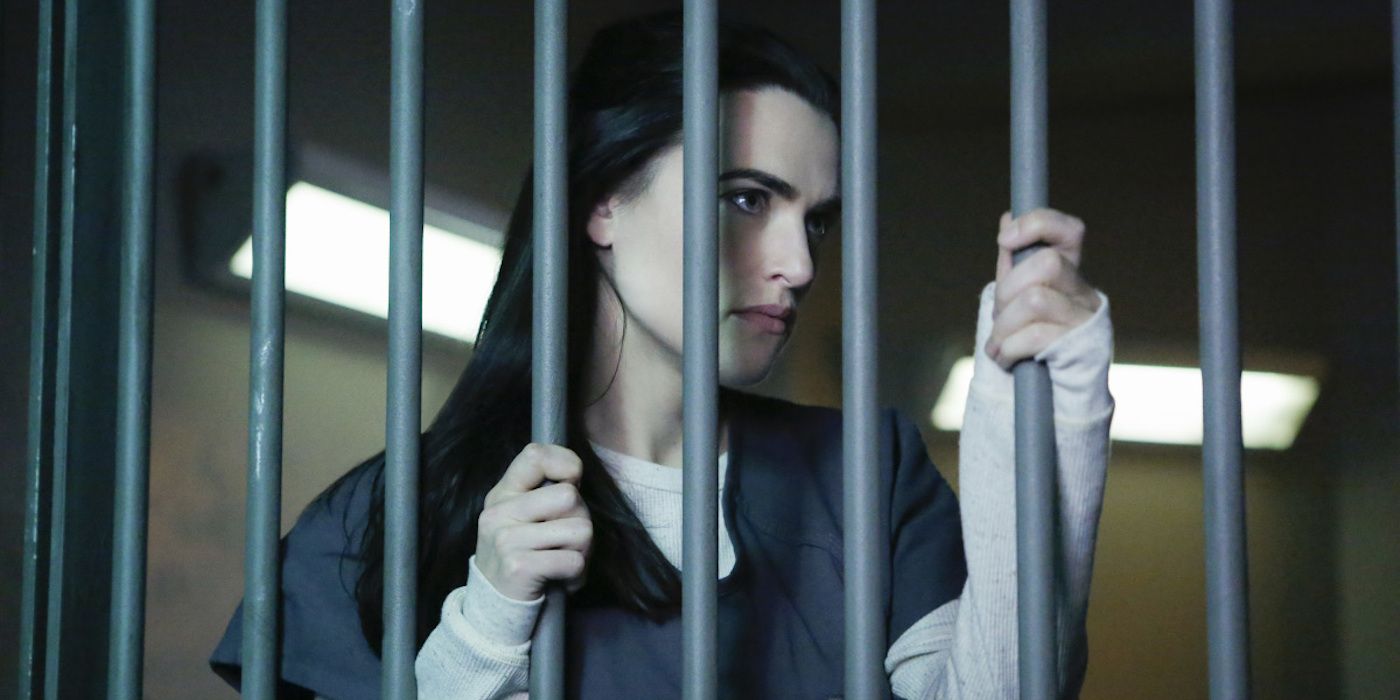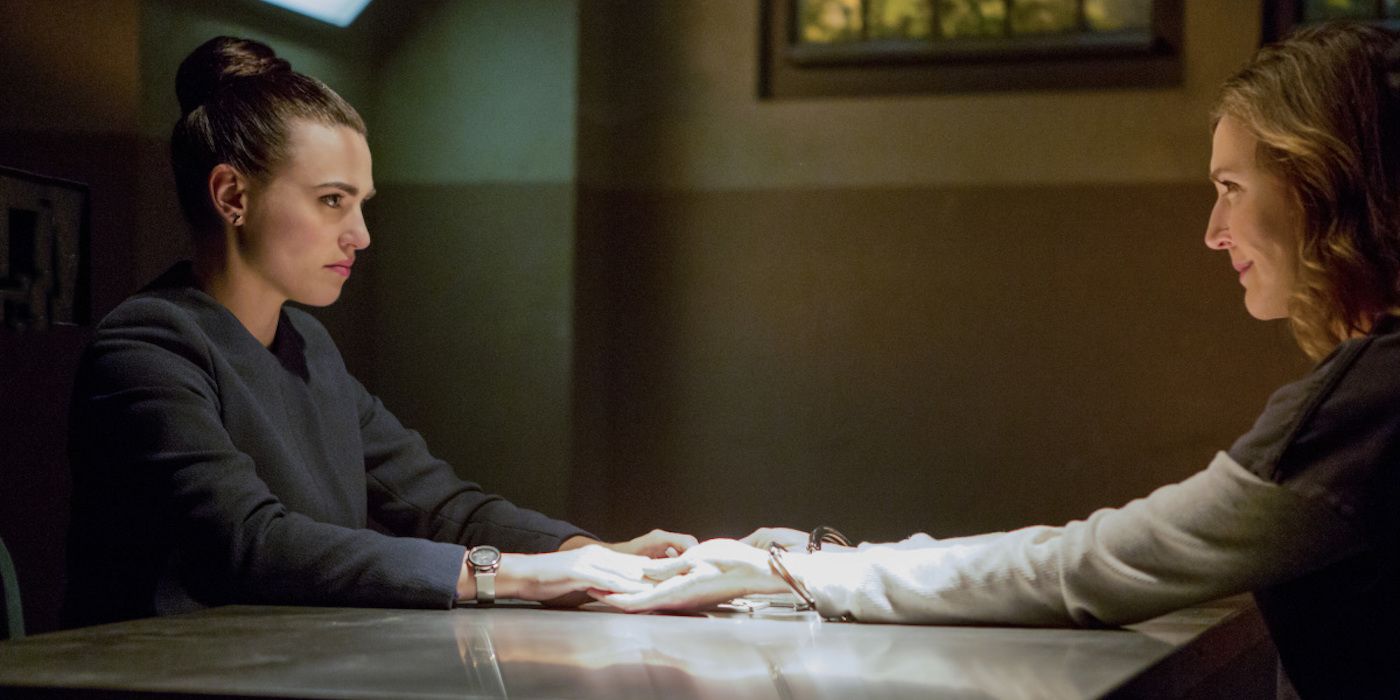Despite indulging in far less overt levels of so-called "fan service" for longtime DC Comics fans than any of The CW's other comic book properties (that's Arrow, Flash, Legends of Tomorrow, Vixen and, at some point soon, Black Lightning), Supergirl arguably relies more heavily on an assumed cultural pre-knowledge of the source material. Not necessarily Supergirl mythology, though - the series has actually been fairly aggressive on building up its own version of Kara Zor-El independent of her (often confusing) comic book origins. Rather, Supergirl consistently counts on its audience to know the broad-strokes history of her cousin.
When James Olsen turn up in the first episode as a handsome, confident, grown man who (at least for awhile) looked like a plausible romantic partner for the titular heroine, it's expected that the audience recognizes him as "Superman's pal Jimmy Olsen" from pop-culture's shared memory-bank. When Kara herself rescues an jetliner full of people in that same debut episode, we're meant to think of Kal-El doing the same thing in his first night of costumed heroism in Superman: The Movie. Whenever a neon green light shows up from anywhere, we're not meant to wonder what it is - we're meant to go: "Oh no! Kryptonite!"
Likewise, that same expected familiarity is also meant to keep the audience on guard by occasionally undercutting expectations. When Kara turns out to be bad at news reporting, or jumps to conclusions in her crimefighting, or struggles in general in areas where Superman would always do the right thing, we're meant to sit up and take notice. There's an element of danger and uncertainty here that might not otherwise be present in a Superman family story.
Season 2's example of this has been Lena Luthor, who turned up early on as a wildcard whose tendency to play her emotions, motives and overall presence close to the vest has made her the rare murkily-defined figure in a series whose characters all tend to have the earnest hyper-emotionalism and innability to hold back opinions and feelings of a particularly sensitive twelve year-old. Presented as immediately suspicious given her stated intent of being a "good" Luthor compared to her brother Lex, the eventual reveal that she was a genuine Supergirl ally and willing best-buddy of civilian-guise Kara (even turning her mother Lilian over to police upon her outing as the leader of CADMUS) was Supergirl's most boldly-stated divergence from being simply a gender-inverted Superman story: Supergirl's Luthor is different.
The question, though, becomes exactly how different?
When Lena Luthor first turned up in National City, Supergirl made it clear she was there to serve as a mirror-character to Kara herself: a professional millennial woman trying to get out from under a family legacy. In Lena's, she's case trying to prove she's nothing like her more famous sibling, who is currently incarcerated after being thwarted by Superman from an evil scheme that's essentially the "nuke California" storyline from the 1978 movie. Lena's out to prove that even though Lex and Lillian are villains, that the Luthor name doesn't automatically predestine one to be a villain- a goal that was implied to exonerate not only herself but also her (apparently) upstanding father Lionel.
Unfortunately, at least some of Lena's faith in this nature-versus-nurture concept has been based on what we (and she) now know to be a set of powerfully false presumptions. Firstly that Lionel Luthor was himself a paragon of virtue, and secondly that she was not a Luthor by blood - having been adopted as a small child by Lillian and Lionel and raised as Lex's younger sister. But as of Episode 12 ("Luthors") both of those pretexts have been turned on their heads. We (and Lena) now know that Lionel Luthor was a serial adulterer who cheated on his wife, and as it turns out Lena was very much his flesh-and-blood daughter - adopted into the family in part to help cover up the affair that produced her.
While Lena ends the episode reaffirming her allegiance to both of Kara's identities, we also closed out on a flashback revealing that as children she and Lex had bonded over a shared love of (and proficiency for) chess... the universal symbol for Bad Guys With Calculating Long-Term Schemes. Oh, and we also learn (for the first time) that in this version of Superman continuity, Clark Kent and Lex Luthor had once been "lifelong best friends," too. Uh-oh...
Granted, this is a superhero show, so this reveal was (for now) chiefly part of the plot mechanics: Lillian and her allies (Metallo and Hank "Cyborg Superman" Henshaw) were on the run looking to plunder Lex's worldwide network of secret anti-Superman weapons bunkers, and sharing his paternal DNA made Lena the only person who could bypass his security locks. The bunker in question turned out to be a treasure-trove of anti-Kryptonian weaponry (including a Black Mercy plant, an "atomic axe" and, most alarmingly of all, Lex's infamous Pre-Crisis Warsuit) and was seemingly destroyed as part of the episode's "Metallo is melting down" ticking-clock subplot, but it leaves things in a somewhat precarious position all the same - and not only because Lillian seemingly escaped with some of Lex's technology.
More substantively, the question of where Lena's story is going is now more up in the air than ever before. While a "good guy" in the fairly black-and-white moral terms Supergirl operates in, a lot of her decisions (i.e. inventing an alien-detecting device) have been presented as being a little too close to her brother for comfort - including her long-con to bring down her mother in the first place. While Kara and Lena eventually winding up at odds has probably been inevitable from the get go (that she's the only "friend-of-Kara" in the cast who's not in on the dual-identity secret makes a scenario where she ends up feeling betrayed and reacting badly all but guaranteed), it carries significantly more danger if Lena starts feeling inclined to join in the family business.
After all, Superman did effectively destroy the very Luthor family name she's been trying to salvage by jailing Lex - and the payoff to the chess flashbacks was ultimately Lena remembering that Lex was actually nice and welcoming to her as a new sister. It might not take much to nudge Lena fully into anti-Supergirl mode in the abstract - she's almost certainly going to be re-investigating her own assumptions about her "evil" brother, especially now that she knows she can easily access all of his hidden bunkers.
It's not hard to imagine that, if Luthor's anti-alien obsessions were inspired by some specific piece of information, discovering it might lead her to similar conclusions. Above all else, Supergirl has framed the idea of (literal) xenophobia being directed against alien immigrants and refugees as its central topical metaphor (one about to be exacerbated by invasions from White Martians and whoever it is that's after Mon-El) - and now the idea of Warsuits (specifically designed to let Luthors beat Kryptonians in hand-to-hand combat) are suddenly in play.
Lena Luthor may end season 2 as a tragic villain, a morally-complicated but "redeemed" figure or something in between - but it's looking less and less likely that she's leaving unscathed.



